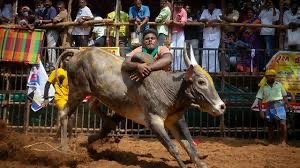In a significant ruling, a constitution bench of the Supreme Court affirmed the validity of state laws that permit cultural events involving animals, specifically highlighting the traditional sport of Jallikattu in Tamil Nadu and bullock or buffalo races in Maharashtra and Karnataka. This decision marks a pivotal moment for the preservation of cultural traditions while ensuring the welfare of animals involved in these events.
The Supreme Court’s constitution bench examined the constitutional validity of the state laws that allowed these cultural events. After careful consideration, the bench upheld the legality of these laws, acknowledging the deep-rooted cultural significance of such practices in the respective states. This verdict recognizes the importance of protecting and promoting cultural heritage while maintaining a balance with animal welfare concerns.
Jallikattu, a traditional bull taming sport, has a long-standing history in Tamil Nadu and holds immense cultural significance for the people of the state. Similarly, bullock and buffalo races are traditional events celebrated in Maharashtra and Karnataka, reflecting the rich heritage and traditions of these regions. These events have been an integral part of the local culture, passed down through generations, and cherished by communities.
The Supreme Court’s affirmation of the state laws concerning these cultural events provides legal clarity and assurance to the organizers and participants involved. It acknowledges that these events are deeply rooted in the cultural fabric of the respective states and are a part of their social identity. By recognizing their significance, the court has ensured that these traditions can continue to be celebrated and preserved within a regulated framework.
However, it is essential to note that the court’s ruling also places a strong emphasis on animal welfare. The bench has mandated strict regulations and safeguards to ensure that these events are conducted without causing harm or unnecessary suffering to the animals involved. These regulations aim to strike a balance between cultural preservation and animal welfare, safeguarding the rights and well-being of animals while allowing the continuation of these age-old traditions.
The decision of the Supreme Court’s constitution bench reflects the judiciary’s role in balancing the diverse aspects of cultural heritage and animal welfare. It recognizes the importance of cultural practices in shaping the identity and social fabric of communities while ensuring that these practices are conducted responsibly and ethically. The verdict sets a precedent for future cases involving similar conflicts between cultural traditions and animal rights, providing guidance for finding a harmonious coexistence between the two.
Additionally, this ruling opens up avenues for discussions on the evolving relationship between culture, tradition, and animal welfare. It encourages dialogue on how to preserve and celebrate cultural heritage while respecting the rights and welfare of animals involved. The court’s decision serves as a platform for stakeholders to come together and work towards finding sustainable solutions that respect both cultural practices and the ethical treatment of animals.
The Supreme Court’s constitution bench has affirmed the validity of state laws allowing cultural events involving animals, such as Jallikattu in Tamil Nadu and bullock or buffalo races in Maharashtra and Karnataka. This landmark decision recognizes the importance of preserving cultural traditions while upholding animal welfare concerns. By striking a balance between these two aspects, the court’s ruling sets a precedent for future cases involving similar conflicts, paving the way for constructive discussions and sustainable solutions that respect both cultural heritage and animal rights.




